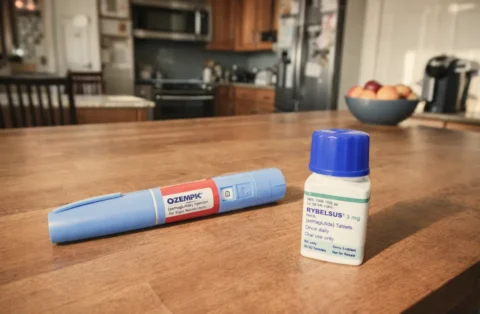What you’ll learn
In this guide, you’ll discover how GLP-1 medications like semaglutide (Ozempic, Wegovy) and tirzepatide (Mounjaro) can support people with PCOS by addressing some key challenges like insulin resistance, weight gain, and hormonal imbalance. Learn who these treatments are right for, what results to expect, and how to get started with a personalized care plan from QuickMD
Living with polycystic ovary syndrome (PCOS) can feel like your body is working against you. It’s a complex hormonal disorder that often includes irregular ovulation, elevated androgen levels, and sometimes cysts on the ovaries. But the impact goes far beyond those symptoms.
Many people with PCOS face ongoing struggles: weight that’s difficult to manage despite real effort, insulin resistance that complicates health, and chronic inflammation that can affect everything from energy to mood. Over time, PCOS can also increase the risk for conditions like type 2 diabetes, heart disease, and high blood pressure.
While weight loss is often recommended as part of PCOS treatment, the condition itself creates real biological barriers that can make progress incredibly difficult. For many, it’s not about a lack of effort but fighting against a body that’s not responding in expected ways. That disconnect can feel discouraging, especially when you’re doing everything “right.”
That’s why approaching PCOS with compassion, the right tools, and a personalized plan matters. With the right support, forward progress is absolutely possible. Even if the path looks different from what you expected.
That’s part of why medications like GLP-1 receptor agonists (including Ozempic, Wegovy, and Mounjaro) have become valuable tools for many people with PCOS. These treatments work with your body’s chemistry, not against it.
In this guide, we’ll look at how these medications work, why they matter for PCOS, and the science behind their approach. They’re not quick fixes, but they are evidence-based treatments designed to support your body in doing something it’s been trying to do all along.
Wondering if a medication like Mounjaro or Ozempic could be part of your PCOS care? Our licensed providers can help you explore safe, affordable options. Speak to a QuickMD provider today.
How GLP-1 medications support weight loss and hormone balance in PCOS
If you’re living with PCOS, you probably know what it’s like to try everything (anti-inflammatory diets, exercise, therapy, hormonal birth control) only to watch the scale barely move.
That frustration is real.
For many, dealing with PCOS is about restoring balance. That means fewer blood sugar crashes, more regular cycles, and more energy to engage in life, not just fit into a different size. The scale might change, but what matters most is how you feel and how your body functions.
At the heart of the issue for many is insulin resistance. When your cells don’t respond well to insulin, your body holds onto more sugar in the bloodstream. That signals it to store fat, and when you add in hormonal imbalances and low-grade inflammation, it can feel like you’re working against your own biology.
GLP-1 medications offer a new tool in that fight. Medications like semaglutide (Ozempic, Wegovy) and tirzepatide (Mounjaro) mimic glucagon-like peptide-1 (GLP-1), which is a natural hormone released in the gut after eating. This hormone is key in regulating blood sugar and appetite: it signals fullness to the brain, slows digestion, and supports balanced insulin levels.
The result? You feel fuller sooner, experience fewer intense cravings, and your blood sugar becomes more stable over time.
And it’s not just anecdotal. In a landmark clinical trial published in The New England Journal of Medicine, people using semaglutide lost an average of nearly 15% of their body weight over 68 weeks, compared to just 2.4% in the placebo group.
A smaller study focusing on women with PCOS showed that even low-dose semaglutide helped 80% of participants achieve significant weight loss, alongside improvements in insulin resistance and menstrual regularity.
Tirzepatide, a newer option that activates both GLP-1 and GIP receptors (glucose-dependent insulinotropic polypeptide), is showing even more promise. Unlike other GLP-1 meds, it seems to reduce the intensity of common side effects like nausea.
That kind of progress could be a watershed moment for women with PCOS who are caught in a discouraging cycle of weight changes, insulin resistance, and hormone disruption. One recent review suggested that tirzepatide might be especially helpful for women with PCOS who are also dealing with obesity or insulin resistance, two common and difficult-to-manage aspects of PCOS.
These medications aren’t a quick fix, and they aren’t right for everyone. But for some people with PCOS, they may offer the first signs of progress after a long period of uncertainty.
GLP-1 medications and PCOS: how they may help beyond weight loss
For many living with PCOS, weight gain is only part of the story. The condition affects multiple systems in the body. That means symptoms often overlap: irregular periods, hormonal acne, excess hair growth, mood shifts, and ongoing fatigue.
GLP-1 medications like Ozempic, Wegovy, or Mounjaro don’t just support weight loss, though. By improving insulin sensitivity and helping regulate blood sugar, they may also ease some of the hormonal imbalances behind these other symptoms.
Androgens (hormones like testosterone that are present in everyone but typically higher in men) can rise in women with PCOS. This hormonal imbalance frequently contributes to acne, increased facial or body hair, and menstrual irregularities.
When insulin levels come down and weight becomes easier to manage, androgen levels may also begin to improve. For some patients, this means more regular cycles, fewer visible symptoms, and less inflammation overall.
Many people also notice indirect benefits. Steady energy throughout the day replaces those crashes. Mood swings soften. Sleep improves. For many women, this stability creates ripples of improvement throughout their lives.
Again, these medications aren’t a magic fix. But they can be a meaningful part of a broader care plan. For women who’ve tried everything without seeing results, GLP-1s offer a different path forward based on how PCOS actually works in your body.
Who GLP-1 medications can help with PCOS (and when they’re a good fit)
GLP-1 medications aren’t a universal solution, but they may be helpful for some people, especially those dealing with insulin resistance, increased hunger, or stubborn weight gain that hasn’t improved with lifestyle changes.
That said, PCOS doesn’t always look the same. People with what’s often called “lean PCOS” may not experience the same weight-related symptoms but still deal with hormone imbalances, irregular cycles, or insulin resistance.
GLP-1s might still be an option, though. Maybe not for weight loss, but potentially for their effects on appetite regulation, insulin sensitivity, or inflammation. The research is still growing, and this is where a personalized treatment plan really matters.
For those dealing with insulin resistance, frequent hunger, or weight gain that doesn’t respond to diet and exercise, these medications may offer a new path forward. They can be instrumental when metabolic challenges begin to overlap with other concerns like prediabetes, high blood pressure, or elevated cholesterol.
Doctors usually consider GLP-1s after other approaches (like lifestyle changes, hormonal birth control, or other medications) haven’t provided enough relief. GLP-1s work best when used alongside these tools, forming a more complete treatment plan that addresses both metabolic and hormonal factors.
It’s also worth noting: weight loss alone isn’t the only goal. Many people with PCOS are looking for more regular cycles, less inflammation, improved fertility, and a greater sense of control over their health. With proper guidance and support, GLP-1 medications may play a role in helping achieve those outcomes.
That said, these treatments aren’t suitable for everyone. A healthcare provider should help assess your symptoms, health history, and goals to determine if they’re a good fit.
If you’re curious whether a GLP-1 medication could support your PCOS care, a QuickMD provider can walk you through your options and help you decide what’s right for your body.
So, what does starting this kind of treatment actually look like? Let’s walk through that next.
Starting GLP-1 treatment for PCOS: what to expect and how it works
Starting a new medication often comes with questions, and GLP-1s are no different. For most people, treatment begins with a low dose that gradually increases over time. This slow start helps minimize side effects, especially nausea or changes in appetite, which are the most commonly reported reactions.
Most people don’t see dramatic changes right away. Instead, early shifts might include feeling fuller more quickly or not thinking about food as often. That’s part of how the medication supports your body’s appetite and blood sugar regulation over time.
For people with PCOS, those changes might show up in other ways too, like fewer cravings tied to insulin resistance, getting more regular periods, or less fatigue related to hormonal imbalances.
Common side effects and how to manage them
Nausea is the side effect most people notice first, but it usually fades as the body attunes. Eating smaller, lighter meals and avoiding high-fat or fried foods can often help.
Other mild side effects might include constipation, fatigue, or dizziness. These are less common, but talk to your provider if they do show up. A change in dosage or timing can make a big difference.
What kind of progress can I expect?
GLP-1s are designed to work slowly and steadily. For some, that means a few pounds lost in the first month. For others, the changes are more internal: steadier energy, fewer cravings, or better blood sugar control. For people with PCOS, these shifts can also include more regular menstrual cycles or even clearer skin as hormone levels begin to rebalance.
That’s why these medications are usually part of a broader plan. Your provider might also recommend lab work, cycle tracking, or nutritional changes to make sure all parts of your PCOS care are working together.
Personalized care is key
Everyone’s PCOS symptoms and health goals are different. What works well for one person might not be the right fit for another.
This is why medical supervision matters. A healthcare provider can help you understand what to expect, monitor how you’re doing, and make adjustments when needed, so the treatment supports your body, not the other way around.
If you’re considering a GLP-1 medication, we can help you explore your options and create a plan that truly fits your needs.
Semaglutide vs. tirzepatide: which weight loss drug works better for PCOS?
If you’ve been exploring GLP-1 medications for PCOS, you’ve probably come across two common names: semaglutide and tirzepatide. While both can be effective, they aren’t interchangeable, and one may be a better fit depending on your specific symptoms and health goals.
What early research and experience tell us
So far, studies directly examining GLP-1 medications for PCOS are limited, but growing. Small trials and clinical use suggest both semaglutide (found in Ozempic and Wegovy) and tirzepatide (found in Mounjaro and Zepbound) can help with weight loss, insulin resistance, and cycle regulation in people with PCOS.
Recent research backs this up. One 2024 study found that these medications helped people with PCOS lose weight, shrink their waist size, lower their triglycerides, and even reduce testosterone levels (which can help with symptoms like acne or hair growth).
Another study showed that even low doses of semaglutide made a real difference for some women.
Many providers also report anecdotal success, especially in patients who haven’t responded to traditional treatments. But formal PCOS-specific research is still catching up, so decisions often come down to how your body responds and what other health conditions you may have.
Key differences between tirzepatide and semaglutide
Both drugs mimic GLP-1, a hormone that helps regulate appetite and blood sugar. The main difference is that tirzepatide also mimics another hormone called GIP, which may offer additional benefits in blood sugar regulation and appetite control.
Some people lose more weight on tirzepatide than on semaglutide. Others find the side effects easier to manage with one over the other. Factors like cost, insurance coverage, and availability may also play a role in which medication makes sense.
Tirzepatide vs. semaglutide for PCOS: choosing what’s right for you
There’s no one-size-fits-all answer. What matters most is how your body responds, how your symptoms change, and how the medication fits into your overall health plan.
Your provider will consider things like your current medications, any history of insulin resistance or heart concerns, and your personal goals. Be honest about your symptoms, your priorities, and any past treatments you’ve tried. Together, you can decide which option (if any) is worth exploring.
And while GLP-1 medications target physical symptoms like insulin resistance and weight gain, they can also play a role in improving confidence and emotional well-being. PCOS can feel isolating at times, especially when symptoms affect your daily life or aren’t easily understood by others.
Managing PCOS is about more than symptoms; it’s about feeling seen, supported, and empowered.
Real experiences from people with PCOS
In a PCOS forum post, one woman shared that simply connecting with others who “get it” made a big difference. She found comfort in support groups, books, and open conversations with people on similar journeys.
Likewise, in a popular Reddit thread, people living with PCOS shared their experiences using medications like Mounjaro and Saxenda. Many reported meaningful weight loss, better cycle regulation, and reduced cravings, especially with GLP-1 medications.
As one user put it:
I was recently diagnosed with PCOS & insulin resistance. I just finished my 5th week of Mounjaro & I’m down 12 lbs…My periods are also normal again! I’m excited to see my bloodwork results soon
These stories reflect how different every journey is, and why compassionate, personalized care matters most.
Access, however, remains a barrier. Some users shared frustrations with insurance denials or strict coupon requirements, while others emphasized the importance of combining meds with long-term lifestyle changes.
A Canadian study found that patients with higher-weight bodies often face delays, cost barriers, and even limited guidance from providers, many of whom aren’t even trained to discuss medical or surgical weight-loss options confidently. For many, the system itself becomes part of the struggle.
It’s really frustrating when the care people need the most is not accessible. We’re constantly working with our partners to remove this barrier so everyone gets the treatment they need.
How QuickMD supports PCOS treatment with weight loss medications
For many people with PCOS, managing symptoms like insulin resistance, weight gain, and irregular cycles takes more than diet and exercise alone. QuickMD helps bridge that gap by offering medical care that’s accessible, private, and tailored to your needs.
We specialize in GLP-1 medication management, including semaglutide (Ozempic, Wegovy) and tirzepatide (Mounjaro). These medications can support weight loss, stabilize blood sugar, and reduce the hormonal imbalances that make PCOS so difficult to manage.
Here’s what QuickMD provides:
- Personalized care from licensed providers. Appointments are patient-led and confidential. You can talk with a doctor from the comfort of home and ask questions about your symptoms and treatment options.
- Convenient access. No waiting rooms. Same-day visits available seven days a week. Medications like Ozempic, Mounjaro, and Wegovy can be sent to your local pharmacy, or you can have them delivered to your door.
- Follow-up care. Providers check in regularly to track your progress and adjust your treatment plan if needed. If you’re managing PCOS alongside other conditions like prediabetes or high cholesterol, they can help coordinate your care.
Whether you’ve just been diagnosed with PCOS or you’ve tried everything without success, you don’t have to manage it alone. QuickMD offers a thoughtful, judgment-free space to explore the next steps and start finding what works for you.
Frequently asked questions about weight loss drugs for PCOS
How long do you need to take GLP-1 medications for PCOS?
The length of treatment can vary based on your symptoms, health goals, and how your body responds. Some people use GLP-1 medications short-term to help reset metabolic health and support weight loss, while others may benefit from longer-term use to maintain insulin sensitivity or cycle regularity. Your provider can help monitor your progress and decide when, and if, it makes sense to taper off or continue treatment as part of your ongoing PCOS care.
Can you take tirzepatide for PCOS if you’re not trying to lose weight?
Yes, some people with PCOS use GLP-1 medications like tirzepatide for reasons beyond weight loss, like improving insulin resistance, managing cravings, or supporting more stable energy. That said, these medications can lead to weight changes, so it’s important you talk to a provider about your health goals. A QuickMD provider can help you decide if this treatment fits your overall PCOS care plan.
Is tirzepatide FDA-approved for PCOS treatment?
No, tirzepatide is currently FDA-approved only for type 2 diabetes management and weight loss, not specifically for PCOS. While clinical trials have shown promising results for weight reduction and improved insulin sensitivity, dedicated studies in PCOS patients are still needed before it can be a standard treatment option.




